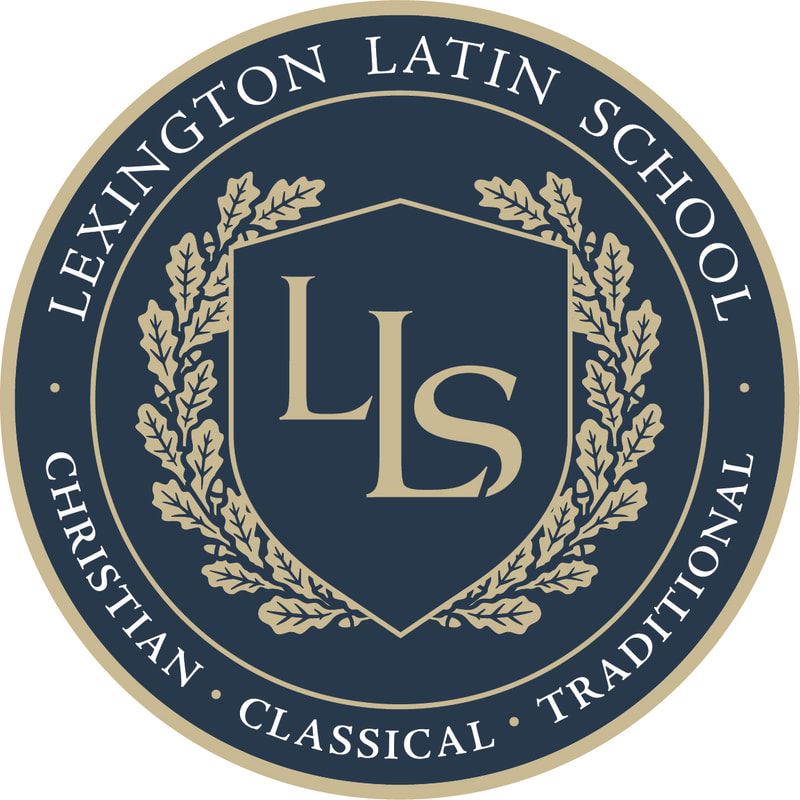Academic Overview
LLS is a Classical School
As a classical school, we focus on the classical language Latin, as well as the classical cultures of the Greeks and the Romans. We also adopt the classical trivium model of education, which describes three stages of learning: the grammar stage (roughly grades K-5), the logic stage (6-8), and the rhetoric stage (9-12).
The Grammar Stage
The main task of the grammar stage of learning is memorization. For example, students memorize math facts and poems, as well as the entire Latin grammar. It's obvious that children at this age love to memorize—for they love to know something to the point of mastery, and they love to share what they have mastered. The primary tasks of the grammar stage are learning to read and memorizing the Latin grammar.
The Logic (or Dialectic) Stage
In the logic stage of learning, students begin to synthesize information. They begin to draw connections between ideas and develop the ability to draw conclusions and to think abstractly. The primary task of the logic stage is (of course) the study of logic, the science of right thinking.
The Rhetoric Stage
In the rhetoric stage of learning, the student's mind and heart come to maturity. He or she moves beyond simple observation of the ideas of others to respond as the heart and mind compel, crafting ideas of his or her own. The student learns to express these ideas effectively with rhetorical skill.
LLS is a Christian School
This means LLS looks at everything in life and learning through the crystal clear and true lens of Christianity. We see God and His handiwork in the beautiful world which He has given us, through the humanity of our fellow man, and through the inherent dignity He bestows upon us. We teach all school subjects knowing God is the author of all worthwhile knowledge. He made up the math, as well as the science. He inspired the great literature we read, the beautiful art we study, and the soul-touching music we are fortunate to hear. He made the very tongues that speak the Latin and English. And He made the ears that hear and interpret the words said. He was there when all history was made and subsequently recorded. Our curriculum and philosophy are a result of that knowledge. Our approach is to seek to cultivate wisdom and virtue through the good, the beautiful, and the true.
Knowledge is power and must be coupled with virtue. We believe our curriculum and the instruction of our teachers guide students to differentiate and know the value of courage over cowardice, loyalty over disloyalty, generosity over avarice, truth over lies, and love over hate. Knowledge without virtue and wisdom is dangerous and can be misused to the harm of many. Knowledge carries with it an inherent necessity to use it wisely and virtuously. Wisdom and virtue come from God alone and the abilities He grants us to know and recognize them.
As a classical school, we focus on the classical language Latin, as well as the classical cultures of the Greeks and the Romans. We also adopt the classical trivium model of education, which describes three stages of learning: the grammar stage (roughly grades K-5), the logic stage (6-8), and the rhetoric stage (9-12).
The Grammar Stage
The main task of the grammar stage of learning is memorization. For example, students memorize math facts and poems, as well as the entire Latin grammar. It's obvious that children at this age love to memorize—for they love to know something to the point of mastery, and they love to share what they have mastered. The primary tasks of the grammar stage are learning to read and memorizing the Latin grammar.
The Logic (or Dialectic) Stage
In the logic stage of learning, students begin to synthesize information. They begin to draw connections between ideas and develop the ability to draw conclusions and to think abstractly. The primary task of the logic stage is (of course) the study of logic, the science of right thinking.
The Rhetoric Stage
In the rhetoric stage of learning, the student's mind and heart come to maturity. He or she moves beyond simple observation of the ideas of others to respond as the heart and mind compel, crafting ideas of his or her own. The student learns to express these ideas effectively with rhetorical skill.
LLS is a Christian School
This means LLS looks at everything in life and learning through the crystal clear and true lens of Christianity. We see God and His handiwork in the beautiful world which He has given us, through the humanity of our fellow man, and through the inherent dignity He bestows upon us. We teach all school subjects knowing God is the author of all worthwhile knowledge. He made up the math, as well as the science. He inspired the great literature we read, the beautiful art we study, and the soul-touching music we are fortunate to hear. He made the very tongues that speak the Latin and English. And He made the ears that hear and interpret the words said. He was there when all history was made and subsequently recorded. Our curriculum and philosophy are a result of that knowledge. Our approach is to seek to cultivate wisdom and virtue through the good, the beautiful, and the true.
Knowledge is power and must be coupled with virtue. We believe our curriculum and the instruction of our teachers guide students to differentiate and know the value of courage over cowardice, loyalty over disloyalty, generosity over avarice, truth over lies, and love over hate. Knowledge without virtue and wisdom is dangerous and can be misused to the harm of many. Knowledge carries with it an inherent necessity to use it wisely and virtuously. Wisdom and virtue come from God alone and the abilities He grants us to know and recognize them.

